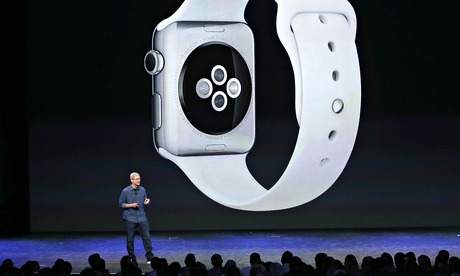
Apple has unveiled its much awaited smartwatch, the first significant product launch from the company since the launch of the iPad and the first that has been fully developed under the leadership of the chief executive Tim Cook.
The Apple Watch, which will be available from early next year, will combine health and fitness tracking, including heart rate monitoring, with communications. It will also be able to store music, provide directions when the wearer is walking, send messages and allow access to hundreds of third-party apps, such as Twitter and Facebook.
At the unveiling in Cupertino, California, Cook called it "the most personal device we've ever created". The launch of the watch, along with two new iPhone models and a smartphones cashless payment system, comes amid increasing pressure from investors, worried about a perceived lack of innovation following the death of Apple's co-founder Steve Jobs.
The new versions of the iPhone have larger screens, in a move to catch up with the growing demand for larger phones, from Asia particularly. The iPhone 6 and iPhone 6 Plus come with a 4.7in and 5.5in screen. The watch screen display is controlled via a crown on the side of the phone, which turns like a traditional jog dial and adjusts functions on the watch, such as zooming and time setting. It also has a touch screen.
"We're at a compelling beginning, designing technology to be worn, to be truly personal," said Jonathan Ive, the British head designer at Apple, as he introduced the range.
Cook added: "We've been working on it for a long time."
An array of designs and straps were shown on stage, before the audience rose to give Cook a standing ovation. The device will be available in three editions: the stainless steel Watch, aluminium Watch Sport, and 18c gold Apple Watch Edition. All three need a constant wireless connection to an iPhone to operate and will start at $349 in the US.
The screen is covered by a curved sapphire glass screen touch screen that can also detect pressure as well as simple touch to differentiate between a tap and a touch. Several of Apple's apps will be available on the Watch, including Siri, Messages, Maps and lots of at-a-glance information pulled from calendars, email and other apps on an iPhone.
The watch feeds the health information into Apple's Health app for the iPhone and iPad, allowing review and analysis of the data.
Apple Watch also includes a new communication app called digital touch, which allows users to tap the screen and send a virtual poke to another wearer, as well as send small drawings and even a heart beat.
The wearable technology market is a growth area for mobile technology as smartphones reach a 70% saturation point in developed markets including the US and UK. Rival watch and wearable device makers are keeping a wary eye on Apple, which up-ended the music industry and drove once dominant phone makers like Blackberry to the brink of extinction, and whose iPad helped shrink personal computer sales for a time before they recently recovered.
"Wearables" have been the subject of intense focus over the past year as Samsung, LG, and most recently Motorola have launched their own "smartwatches" using Google's Android system.
But analysts forecast that Apple would rise to dominate the market next year. "The wearables market has so far lacked a leader to fire up the masses, and all eyes are on Apple at this point," said eMarketer's senior analyst Cathy Boyle.
Cook also hailed a new system to drive mobile payments via smartphones using fingerprint recognition which he said would "create an entirely new category of service".
The ApplePay system aims to kickstart the so far slow-moving market for mobile payments, which banks and credit card companies have struggled to get people to adopt, but could also give Apple growing power in the payments industry. "ApplePay will forever change the way all of us buy things," said Cook.
The ApplePay system, which works with the newly announced iPhone 6 and 6 Plus phones, stores the details for any customer card on the phone securely in a form that cannot be extracted even if the phone is stolen. Transactions are authenticated by a fingerprint sensor on the phone, sending a onetime "token" via the shortrange NFC system to the retailer's terminal to authorise payments.
Eddy Cue, Apple's head of services, emphasised that customer privacy was key.
The iPhone is Apple's biggest source of revenue, generating more than 50% of its total sales in any quarter, and the move to introduce larger screens years after rivals such as Samsung will shore up its position as competition intensifies in the smartphone market, where Chinese rivals such as Huawei and Xiaomi have begun to eat into the sales of established players.
The Flint Center holds a particular resonance for Apple because it was the location for the launch of the first iMac "marking the rebirth of Apple", said Cook.
"I usually go through some numbers but today we have so much to go through I'm going to dispense with that other than to say everything's great," Cook said.

